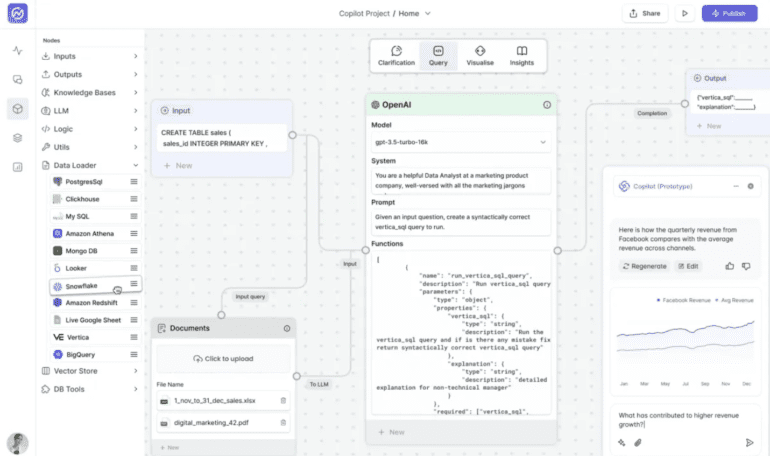TL;DR:
- Crux is at the forefront of GenAI-powered business intelligence, catering to enterprises navigating rapid technological advancements.
- Co-founded by Himank Jain, Atharva Padhye, and Prabhat Singh, Crux specializes in AI models that interpret business data via natural language commands.
- The platform converts database schemas into a semantic layer for AI comprehension, offering customizable question-answering models to enhance output quality.
- Employing a multi-model framework, Crux dissects user queries and deploys purpose-built models like the “clarification agent” for effective interpretation.
- With a focus on profitability, Crux generates revenue through subscriptions and setup/maintenance fees, boasting $240,000 in annual recurring revenue within four months.
- Despite a lean operational structure, Crux plans expansion fueled by a recent $2.6 million investment, targeting high-value enterprise clients for growth.
Main AI News:
Crux is pioneering the development of GenAI-powered business intelligence solutions, catering to the fast-paced demands of modern enterprises. As GenAI continues to evolve rapidly, businesses face the dual challenge of keeping abreast of advancements while ensuring the efficacy, compliance, and security of their implementations.
In response to this pressing need, a wave of startups has emerged, specializing in tailoring GenAI tools to suit enterprise requirements. Among them are Arcee, dedicated to creating secure and efficient GenAI solutions for training and management, and Articul8 AI, a spin-out from Intel focused on algorithm-driven enterprise software.
The latest addition to this cohort is Crux, founded by Himank Jain, Atharva Padhye, and Prabhat Singh. Crux’s mission is to develop AI models capable of interpreting business data through natural language commands, akin to OpenAI’s ChatGPT. Padhye elucidates: “Our platform enables executives to obtain reports, insights, root cause analyses, or predictions effortlessly through simple natural language queries,” he explains.
Crux’s journey to its current iteration has been marked by nearly 15 pivots, culminating in a platform that converts database schemas into a semantic layer understandable by AI models. Moreover, Crux empowers customers to customize question-answering models to align with their specific business intelligence needs, thereby enhancing the quality of outputs.
Utilizing a multi-model framework, Crux dissects user queries into constituent components, distributing them across purpose-built models. For instance, the “clarification agent” model poses follow-up questions to discern user intent effectively. Crucially, Crux operates on-premise and abstains from utilizing customer data for model training.
“Crux endeavors to introduce an AI-powered decision-making engine tailored for enterprises,” Padhye asserts. “We challenge conventional business intelligence tools by iterating rapidly and reconceptualizing the analytics stack as a decision-making stack.”
Revenue generation for Crux hinges on subscription sales and setup/maintenance fees, contingent upon deployment type and scale. Notably, the company has achieved profitability, boasting an annual recurring revenue of $240,000 within four months and securing a clientele comprising four companies.
While maintaining a lean operational structure, with a projected headcount of around 20 personnel by year-end, Crux harbors expansion ambitions buoyed by a recent $2.6 million investment from Emergent Ventures, Y Combinator, and angel investors. Primarily, Crux aims to target high-value enterprise clients as part of its up-market growth strategy.
Anupam Rastogi of Emergent Ventures emphasizes the transformative potential of large language models and advanced AI in the realm of business intelligence and data analytics. He predicts a paradigm shift from static dashboards to real-time, actionable intelligence, applauding Crux’s innovative product for facilitating rapid revenue augmentation and garnering substantial customer interest.
Conclusion:
The emergence of Crux and its innovative GenAI-powered business intelligence solutions signals a transformative shift in the market landscape. Enterprises now have access to sophisticated tools that facilitate effortless interpretation of complex data through natural language queries. This signifies a growing demand for advanced AI-driven analytics platforms, paving the way for enhanced decision-making and operational efficiency across industries.

